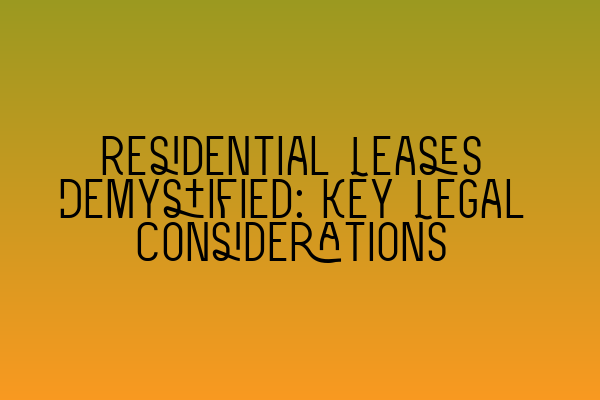Residential Leases Demystified: Key Legal Considerations
If you are considering leasing a residential property or are already a landlord or tenant, understanding the key legal considerations surrounding residential leases is crucial. From rights and obligations to disputes and termination, this blog post will demystify the complex world of residential leases, allowing you to navigate this area of property law with ease.
1. What is a Residential Lease?
A residential lease is a legal agreement between a landlord and a tenant that outlines the terms and conditions of renting a residential property. It sets out the rights and obligations of both parties and governs their relationship throughout the tenancy. Whether you are a landlord or a tenant, it is vital to have a comprehensive understanding of the terms specified in the lease.
2. Types of Residential Leases
There are various types of residential leases, including fixed-term leases, periodic leases, and assured shorthold tenancies (ASTs). Each type has its own set of rules and regulations, which determine the rights and responsibilities of both parties. Understanding which type of lease you are entering into is crucial, as it can impact your rights in relation to termination, rent increases, and repairs.
3. Tenant’s Rights and Obligations
As a tenant, it is crucial to be aware of your rights and obligations under a residential lease. These may include:
– The right to quiet enjoyment of the property, free from interference by the landlord.
– The obligation to pay rent on time and in full.
– The obligation to report any repairs or maintenance issues promptly.
– The right to have repairs carried out within a reasonable timeframe.
Being aware of your rights as a tenant can help you protect yourself against unfair practices and ensure a smooth tenancy.
4. Landlord’s Rights and Obligations
Landlords also have specific rights and obligations under residential leases, including:
– The right to receive rent on time and in full.
– The obligation to maintain the property in a good state of repair.
– The right to access the property for inspections and repairs, with proper notice given.
– The obligation to protect the tenant’s deposit in a government-approved deposit protection scheme.
Understanding these rights and obligations will help landlords fulfill their legal responsibilities and avoid potential disputes with tenants.
5. Disputes and Resolution Mechanisms
Disputes between landlords and tenants are an unfortunate reality in some residential leases. Common issues include rent arrears, deposit disputes, repairs, and eviction. Understanding the dispute resolution mechanisms available, such as negotiation, mediation, or court proceedings, is vital for both parties.
In the event of a dispute, seeking professional legal advice is recommended to ensure your rights are protected and the matter is resolved in a fair and lawful manner.
6. Termination of Residential Leases
Whether you are a landlord or a tenant, terminating a residential lease requires careful consideration of the legal requirements and notice periods. It is essential to comply with the terms outlined in the lease agreement and any applicable legislation to ensure a lawful termination of the tenancy.
7. Seeking Professional Legal Advice
Navigating the intricacies of residential leases can be challenging, especially for individuals without a legal background. Seeking the guidance of a solicitor with expertise in property law can help you navigate the process and ensure your rights are protected.
At SQE Property Law & Land Law, our team of experienced solicitors specializes in residential lease matters. We can provide expert advice and assistance throughout the entire process, from reviewing lease agreements to resolving disputes and facilitating lawful terminations.
Conclusion
Understanding the key legal considerations surrounding residential leases is essential for both landlords and tenants. By familiarizing yourself with the rights and obligations outlined in the lease agreement, seeking professional legal advice when necessary, and following the proper procedures for disputes and terminations, you can ensure a smooth and legally compliant tenancy.
For comprehensive preparation and practice materials for the SQE exams, check out our related articles:
– SQE 1 Practice Exam Questions
– SQE 1 Practice Mocks FLK1 FLK2
– SQE 2 Preparation Courses
– SQE 1 Preparation Courses
– SRA SQE Exam Dates
Remember, having a solid understanding of residential leases and property law is crucial to protect your rights and interests. If you need legal assistance or further guidance, do not hesitate to contact SQE Property Law & Land Law. Our expert team is here to help you navigate the complexities of residential leases with confidence.
